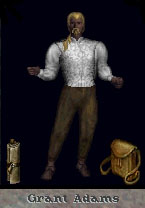BNN: Interview with Grant Adams
From Atlantic Roleplay Wiki
Interview with Grant Adams
Garth Ranzz
UP: Britannia
Grant Adams is the Defense Attorney in the “FoA Leader Trial.” I was assigned to meet the man in his offices in Skara Brae and was struck by the openness and forthrightness of the man. He never fails to make eye contact, and seems to have an eternal smile on his youthful face. But this natural charm belies the seriousness and depth of his convictions. Surrounded by momentos of his short, but illustrious career, the following interview was conducted.
Garth Ranzz: Perhaps we could start, Mr. Adams, with telling our readers a bit about yourself?
Grant Adams: *chuckles* Well, let’s start off with just calling me “Grant”—I don’t see any pressing need for formality in this venue...

As for the meat of your question, I am a native Skara Braen. My parents are both farmers. I studied law in Britain, of course, but decided the pace of the city was a bit faster than I cared for. I guess you could call me an old country lawyer. *laughs*
GR: Many were surprised by your appointment as the Defense counsel for the “FoA Leader trial.” Do you have any comment on that?
GA: Actually, I was a bit surprised myself. I believe the King’s desire was to find a lawyer with no preconceived notions on the case, and who would mount a credible defense in the face of stiff competition.
- chuckles* I suppose Skara’s natural tendency to stay out of national events has served us well this time!
GR: You brought up the notion of a “fair” trial—given the attention and high profile of this case, do you think such a thing is possible?
GA: Ayuh. Were it not, I’d’ve not taken the case. In fact, my role here is to keep things as fair as possible.
GR: What of the delicate political ramifications?
GA: Many of the Citizen’s of our land supported the “FoA”—which, I suppose, would give pause to any monarch—but my only concern in this matter is the defense of a single individual.
GR: Feelings are strong on both sides.
GA: Ayuh. All we can judge on, however, is the evidence—emotion has little place in a trial. I have examined the State’s case and, frankly, I think a great deal of it is weak, and is based on circumstantial evidence and hearsay.
GR: Would you care to expand on that?
GA: Sure—one of the key points in law is the presumption of innocence. The State, even in a Treason case, such as this one, must prove guilt Beyond a Reasonable Doubt.
I am quite confident that I can prove several of the allegations to be utterly baseless, and to introduce enough doubt to eliminate the rest.
GR: This isn’t the first time you’ve been involved in what many call an “unwinnable case”—several years ago you rose to national prominence during your spectacular defense of the accused “Red Arrow Killer”.
GA: The two cases are not wholly dissimilar—a mountain of circumstantial evidence, and a defendant who has largely been tried and convicted in the court of public opinion before reaching the bench. I met Jo Wazzo then, and I knew, just by looking in his eyes, that he was innocent. That young man simply could not have killed eight women in such a gruesome manner. It simply wasn’t in him.
We took each piece of evidence one at a time, and exposed the hypocrisies behind them—showed when the witnesses were confused, or were being led by the guards to give certain answers. This is one of the basics of criminal defense.
GR: Your position in this case is likely to garner you many enemies.
GA: *shrugs* My job is to aid the Court in finding the Truth, and giving the Defendant a real chance to have their say.
Ultimately the goal in these proceedings, as in any other, is Justice, not Vengeance. Those are very different concepts, though many confuse them. We need to be careful, in our rush to bring this matter to trial, to put aside our preconceptions, and look only at the facts in the case.
GR: Do you have any last words for our readers?
GA: Only to look at your sources of information before blindly accepting them. For example, all along the media has been calling this the “FoA Leader Trial.” But who gave the defendant this designation? Yes, the media itself. Judge Arlis has not yet authorized us to release the man’s true name, for fears of his family’s safety, but the very name reduces him to inhuman status. I hope to show you the man behind the accusations. Judge on the evidence, only, and check your sources.
GR: Thank you very much for your time, Mr. Adams
GA: Grant. *smiles* And thank you for your time—I’m just doing my job.